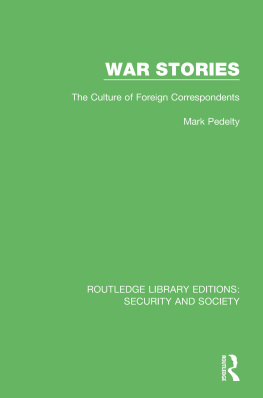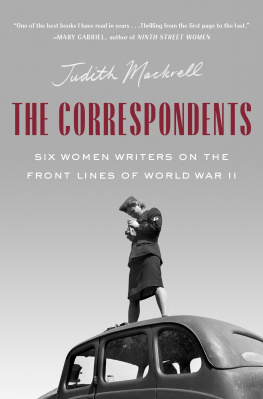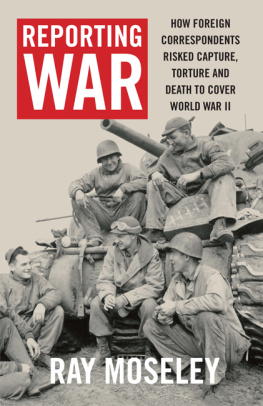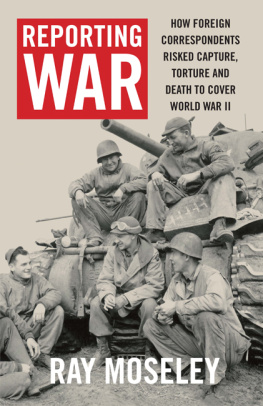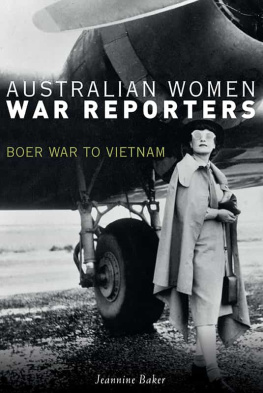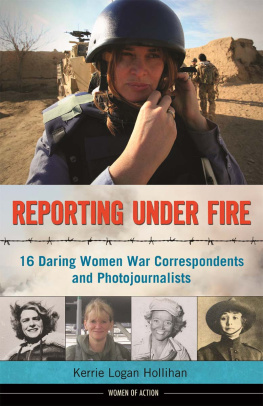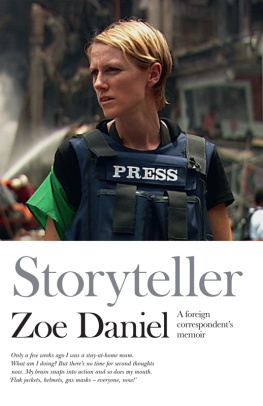ROUTLEDGE LIBRARY EDITIONS: SECURITY AND SOCIETY
Volume 10
WAR STORIES
WAR STORIES
The Culture of Foreign Correspondents
Mark Pedelty
First published in 1995 by Routledge
This edition first published in 2021
by Routledge
2 Park Square, Milton Park, Abingdon, Oxon OX14 4RN
and by Routledge
52 Vanderbilt Avenue, New York, NY 10017
Routledge is an imprint of the Taylor & Francis Group, an informa business
1995 by Routledge
All rights reserved. No part of this book may be reprinted or reproduced or utilised in any form or by any electronic, mechanical, or other means, now known or hereafter invented, including photocopying and recording, or in any information storage or retrieval system, without permission in writing from the publishers.
Trademark notice: Product or corporate names may be trademarks or registered trademarks, and are used only for identification and explanation without intent to infringe.
British Library Cataloguing in Publication Data
A catalogue record for this book is available from the British Library
ISBN: 978-0-367-56733-0 (Set)
ISBN: 978-1-00-312078-0 (Set) (ebk)
ISBN: 978-0-367-56993-8 (Volume 10) (hbk)
ISBN: 978-1-00-310028-7 (Volume 10) (ebk)
Publishers Note
The publisher has gone to great lengths to ensure the quality of this reprint but points out that some imperfections in the original copies may be apparent.
Disclaimer
The publisher has made every effort to trace copyright holders and would welcome correspondence from those they have been unable to trace.
W a r
S t o r i e s
The Culture
of Foreign
Correspondents
Mark Pedelty
Published in 1995 by
Routledge
29 West 35th Street
New York, NY 10001
Published in Great Britain in 1995 by
Routledge
11 New Fetter Lane
London EC4P 4EE
Copyright 1995 by Routledge
Printed in the United States of America.
All rights reserved. No part of this book may be reprinted or reproduced or utilized in any form or by any electronic, mechanical or other means, now known or hereafter invented, including photocopying and recording, or in any information storage or retrieval system, without permission in writing from the publishers.
Library of Congress Cataloging-in-Publication Data
Pedelty, Mark.
War stories: the culture of foreign correspondents / Mark pedelty
p. cm.
Includes bibliographical references and index.
ISBN 0-415-91123-0 (cloth) ISBN 0-415-91124-9 (pbk.)
1. War correspondents. 2. JournalismObjectivity. I. Title.
PN 4823.P43 1995
94-23388
070.4'332dc20
CIP
British Library Cataloging-in-Publication Data also available.
To Karen
I am aware that this discussion is unconventional anthropology; but these are unconventional times. We are all involved in unconventional and portentous military and political events in this country, perhaps more directly than many of us have realized until recently. These events have world-wide consequences. It is time that we accepted some unconventional responsibility for our acts, be they acts of commission or of omission.
from Gerald Berremans 1967 article Is Anthropology Alive?
Current Anthropology 9(5): 391-96.
I thank the Regents of the University of California for providing the necessary funds for my research in the form of a William Harrison Mills Traveling fellowship, Graduate Humanities Research Grant, and Lowie Funds for Anthropological Research. I am indebted to the Center for Latin American Studies and Tinker Foundation for providing additional research funds.
I am also indebted to Nancy Scheper-Hughes, Jack Potter, James Anderson, Margaret Conkey, Beatriz Manz and other members of the Berkeley faculty who have encouraged, inspired, and aided in my work on this project. I also thank the members of the Center for Latin America Studies workshop on political violence and terror: James Quesada, Margarita Melville, Liegh Carol, and especially, Sheila Tulley. Thanks to Tim Strawn, Rod Benson, Peter Redfield, and Rebecca Chiao for their useful comments. It has also been my privilege to work with Todd Gitlin. This project would neither have been born nor completed were it not for the considerable contribution he has made to my educational development, in general, and this ethnography, in particular. I would also like to express my gratitude to Thomas Long for the photograph which appears on the cover and for his exemplary visual and print news coverage of Central America as a whole. Finally, special thanks to Gerald Berreman, adviser to this project. He has struggled to make the discipline, the department, and the university a more humane place. His scholarship and example have been, and will continue to be, an aid and inspiration.
I especially thank my parents and family for their support. Above all, I acknowledge the contributions of Karen Miksch. I would not have been able to complete this, nor had the desire to, without her aid and companionship.
A special thanks to Elba, Calixto, Blanca Rosa and other Salvadoran friends who taught me about El Salvador, got me through the periods of illness, and made my time there a pleasure. A special thanks to Carmelo, who lived and died to improve the world.
Finally, I thank all the journalists and others who participated in this study. I wish I could list all of you here. You have shown incredible kindness letting me into your lives and work. I am extremely grateful and hope this book will in some small way aid you in your struggle against violence and censorship.
acem Foreign Correspondents Association of Mexico aid U.S. Agency for International Development afp Agence France Press ap Associated Press arena Nationalist Republican Alliance cdhes Human Rights Commission of El Salvador (nongovernmental) cispes Committee in Solidarity with the People of El Salvador coprefa Armed Forces Press Committee erp Peoples Revolutionary Army fdr Revolutionary Democratic Front fenastras National Federation of Salvadoran Workers fmln Farabundo Marti National Liberation Front oas Organization of American States orden Democratic Nationalist Organization pcn National Conciliation Party pdc Christian Democratic Party rn National Resistance salpress Salvadoran Press Association speca Salvadoran Foreign Press Corps Association uca Jose Simon Canas Central American University udn National Democratic Union ues University of El Salvador upi United Press International
Within the logic of capitalism
the free press is simply another market
and in its totality
every person it touches must pay for it:
for the people, freedom of the press costs twenty cents per head.
from the poem Statistics Concerning Liberty
by Salvadoran poet Roque Dalton (1987:16)
I was visiting a member of the Salvadoran Foreign Press Corps Association ( speca ) when suddenly the shout Un muerto! Un muerto! (a corpse) rang out in the halls of the Camino Real Hotel. The reporters spent most of their time at the Caminowriting, talking, playing, but most of all, waiting in their rented offices. They waited for interviews, press conferences, and if really lucky, a corpse. It was the fall of 1991 and the war in El Salvador was coming to an end, but the battlefield death toll remained as high as ever as both sides fought for territory and increased leverage at the negotiating table. The number of political killings had been steadily decreasing, however, so this corpse excited the journalists.

